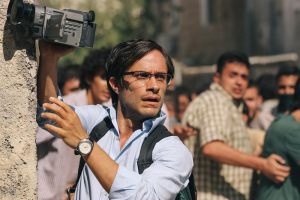
Gael Garcia Bernal plays Newsweek reporter Maziar Bahari in Jon Stewarts directorial and screenwriting debut film “Rosewater.”
★★★★★
It’s tough to find a lasting sense of humor when you take a closer look at the horror of the world’s latest current events. With multiple journalists falling victim to the violent radicalism of the Islamic State, somber stories seem to be emerging every day on our news outlets. Yet amid these trying times, Jon Stewart has somehow found a way to uplift our spirits from this constant stream of shock and terror.
In his directorial and screenwriting debut film “Rosewater,” the “Daily Show” host puts us right into the sludge of the muckraking journalism in the Middle East. Based on the memoir “And Then They Came for Me” by Maziar Bahari, a Canadian-Iranian who followed the controversial Iranian presidential election of 2009, the movie follows the Newsweek reporter’s harrowing journey of truth-seeking and imprisonment that captured the attention of the global media.
The book is a tale of love and high spirits in the face of hardship, and it seems fitting that Stewart rose to the challenge of transforming it into a movie. Stewart preserves much of the story’s authenticity, focusing on the minute details that humanize an often negatively stereotyped Iranian culture. Rosewater is referenced at the very beginning of the movie, where the character of Bahari, played by Gael Garcia Bernal, recalls going to a temple with his mother to be soaked in its fragrance. The motif becomes a nickname for his interrogator during his time in Evin Prison, because he has a habit of spritzing himself with pungent rosewater cologne. Drawing on these idiosyncratic moments, Stewart is able to break down the wall of high-budget Hollywood action flicks and focus on what really matters: what these people are fighting for and what truly makes them tick.
Stewart instills these humanized scenes with an expert balance of humor and harsh reality that has the audience laughing at instants of incredulity and gasping at the scenes of violence. In one moment, Bahari is taken outside, where an unloaded gun is held to his head and the trigger is pulled simply to torment him. Yet in another particularly funny scene, Bahari realizes that Rosewater has an obsession with pornography, and he starts making up outlandish fantasy stories about his travels (with one such scandalous tale apparently taking place in the infamous New Jersey) that immediately make the audience chuckle.
Although a large chunk of the movie chronicles Bahari’s time spent in solitary confinement and the interrogation room after his arrest for his coverage of protests following the elections, the overall message extends far beyond any one person. Stewart creates multiple thematic layers, some more subtle than others, that add depth to the film and make it even more relevant to today’s political and social landscape.
His portrayal of technology definitely strikes a chord with the audience. In the moments of escalating oppression and revolt, Stewart always includes some form of communicative technology, whether it’s hands with raised phones, cleverly placed video cameras or a rooftop of hidden satellite dishes.
These themes are compounded by Stewart’s cinematic skill, which is a pleasant surprise for his first time directing. Shaky camerawork, real footage shot by Bahari and closely zoomed-in shots of the characters work in “Rosewater’s” favor, giving the story an intimacy that normal Hollywood movies lack.
There is a scene towards the end of the movie where Stewart’s directorial creativity especially shines. The Iranian police are ordered to destroy the illegal rooftop satellite city, and Stewart alternates between shots of them smashing apart this machinery and the figure of a boy standing behind a transparent door in the background. At first the message seems obvious — that young people witness oppression and will be the leaders in a future uprising. But when the camera flashes back to the boy yet again, he is holding up a phone filming the event. In a flash, the scene takes on a whole new meaning as it’s inferred that the documented incident can now be released to the world without delay.
It cannot be understated how much technology as a truth-seeking device is mentioned throughout the story. To mirror this constantly changing environment of instant connections and global consequences, Stewart portrayed this information flow in interesting and novel ways.
While the feature film won’t captivate audiences with amazing action scenes and dramatized computer graphic effects, it stays true to the heart of a story that we get glimpses of almost every day. It offers a depiction of the Iranian election and the dangers of journalism in the Middle East that educates the audience and makes them aware of their part in this grand web of information sharing. I’d recommend “Rosewater” wholeheartedly, as you’ll end the movie having been shaken not just by its powerful message, but also by quite a few laughs.














